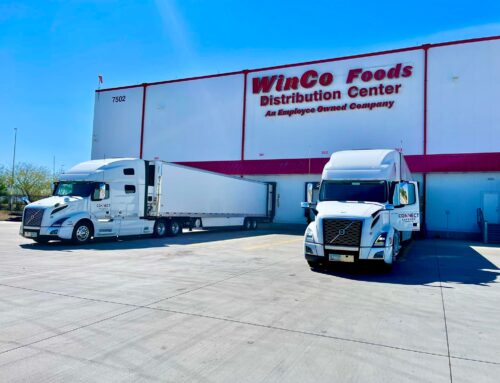
Table Of Contents:
- Reliable Transport Refrigerated Services for Your Business Needs
- Key Takeaways
- Understanding Transport Refrigerated Services
- Key Features of Reliable Refrigerated Transport
- Selecting the Right Transport Refrigerated Service Provider
- Cost Factors in Transport Refrigerated Services
- Regulatory Compliance in Refrigerated Transport
- The Future of Transport Refrigerated Services
- Conclusion
Reliable Transport Refrigerated Services for Your Business Needs
When it comes to transporting perishable goods, many businesses face challenges related to maintaining the right temperature and ensuring timely deliveries. Reliable transport refrigerated services play a crucial role in logistics, ensuring products remain fresh and undamaged throughout the journey. This article will explore key features of dependable refrigerated transport, highlight how to select the right service provider, and outline cost factors involved. By reading on, businesses will understand how to enhance customer satisfaction and streamline their logistics processes, ultimately creating better career opportunities within the industry.
Key Takeaways
- Temperature control is essential for preserving the quality of perishable goods during transport
- Advanced technology ensures real-time monitoring, enhancing safety for sensitive cargo
- Regulatory compliance safeguards product integrity, protecting against spoilage and legal issues
- Flexible transport solutions help businesses adapt to fluctuating demands and maintain quality control
- Sustainability practices are vital for reducing the environmental impact of refrigerated transport operations
Understanding Transport Refrigerated Services

Temperature control is crucial in transport, particularly for preserving the integrity of perishable goods. Refrigerated services cater to diverse cargo, including food, pharmaceuticals, and chemicals. Industries such as grocery, healthcare, and logistics heavily rely on these services to maintain quality. Understanding these aspects will highlight their importance in effective transport operations across regions such as Mexico and Canada. Additionally, trucking information is vital for managing transport logistics, and logistics weekly provides the latest updates in the industry. Moreover, exploring career opportunities in these sectors can attract skilled professionals.
Importance of Temperature Control in Transport
Temperature control is integral to maintaining the shelf life of perishable goods transported across North America. Without effective refrigerated transport, products such as food and pharmaceuticals may spoil, leading to significant losses for businesses. Utilizing freight broker resources, logistics weekly, trucking information, and career opportunities can enhance the efficiency of nationwide refrigerated services, ensuring compliance with customs regulations and safeguarding the quality of sensitive cargo throughout its journey. Additionally, landline media can support communication efforts within the logistics network.
Types of Cargo Ideal for Refrigerated Services
Refrigerated transport services are essential for a wide range of cargo, particularly items that require strict temperature controls to maintain quality. This includes perishable goods like fruits, vegetables, dairy products, and meat, as well as pharmaceuticals and certain chemicals. The trucking industry association emphasizes the need for specialized fleets equipped with appropriate technology and offers numerous career opportunities to ensure these products are protected during distribution, thereby helping businesses mitigate the risks associated with spoilage and loss. Staying informed through truckers news, logistics weekly, and landline media about advancements in refrigerated transport can further enhance effectiveness, leveraging truckload resources and trucking information that align with specific logistical needs.
Common Industries Utilizing Transport Refrigerated Services
Various industries across America depend on reliable refrigerated transportation to ensure product quality and safety. The foodservice sector, including restaurants and grocery stores, heavily relies on these services to deliver fresh produce, dairy, and meats while minimizing waste and promoting sustainability. Additionally, the pharmaceutical sector requires precise temperature control to maintain the integrity of drugs, making professional truck drivers essential for executing these critical deliveries efficiently. For more trucking information, companies consult resources like logistics weekly and landline media to stay updated on industry trends and career opportunities for aspiring drivers.
Transport refrigerated services are essential for keeping goods fresh and safe. Now, let’s explore the key features that make reliable refrigerated transport stand out.
Key Features of Reliable Refrigerated Transport

Reliable refrigerated transport services are defined by advanced refrigeration technology and equipment that ensure optimal temperature control. Real-time temperature monitoring systems provide ongoing oversight, preserving cargo integrity. Additionally, experienced drivers trained in food safety principles play a critical role in safeguarding shipments. Understanding these key features is essential for businesses seeking secure and efficient transportation solutions. For those exploring arizona trucking options, staying updated with logistics weekly, landline media and freight news can assist in making informed decisions. Businesses interested in career opportunities can explore available positions, and accessing trucking information is crucial. To learn more or request a quote, businesses can rely on these pivotal aspects of refrigerated transport.
Advanced Refrigeration Technology and Equipment
Advanced refrigeration technology and equipment are vital components in maintaining a secure cold chain for freight transportation and trucking information. These systems are designed to manage precise temperature controls, ensuring that cargo remains within the required parameters throughout the logistics management process as highlighted in logistics weekly. For example, real-time temperature monitoring devices provide continuous updates through landline media, allowing for immediate intervention if temperature deviations occur, thereby safeguarding the integrity of perishable goods within the supply chain. Additionally, companies in this sector often advertise career opportunities to attract skilled professionals.
Term:
Real-Time Temperature Monitoring Systems
Real-time temperature monitoring systems represent a significant innovation in refrigerated transport, crucial for businesses dealing with frozen food and perishable items and offering career opportunities. These systems use advanced technology to continuously track temperature levels within trucks, ensuring that cargo remains within specified parameters throughout the journey. By providing immediate alerts for any deviations, they enhance customer service standards, allowing logistics companies to address issues swiftly, thereby ensuring the safety and quality of shipments delivered via dry van services. Publications like logistics weekly and landline media offer valuable trucking information to support these operations.
Experienced Drivers Trained in Food Safety
Experienced drivers, offering career opportunities and trained in food safety, are vital for effective refrigerated transport services. These professionals not only understand the importance of maintaining appropriate temperature controls but also know how to leverage technology to enhance their operations, utilizing the latest trucking information from sources like logistics weekly and integrating landline media for effective communication. Companies like connect express llc prioritize dedicated services that improve productivity, ensuring that perishable goods are handled with the utmost care during flatbed transportation, ultimately safeguarding product quality throughout the supply chain.
Finding the right transport provider is like choosing the best tool for a job. The right choice can make all the difference in the quality of what arrives at your door.
Selecting the Right Transport Refrigerated Service Provider

When selecting a transport refrigerated service provider, evaluating credentials, career opportunities and experience is essential for ensuring reliable services. Customer reviews and testimonials, such as those found in logistics weekly and landline media, offer valuable insights into the provider’s performance and reputation. Additionally, flexibility and scalability in transport solutions, supported by up-to-date trucking information, are crucial for meeting evolving business needs. Each of these aspects contributes to making informed decisions that safeguard product quality and operational efficiency.
Evaluating Service Provider Credentials and Experience
Evaluating the credentials and experience of a transport refrigerated service provider is essential for ensuring the delivery of high-quality services. Companies should look for providers with a proven track record in handling perishable goods, including certifications in food safety and temperature management. Furthermore, seeking recommendations and analyzing customer testimonials from sources like logistics weekly, landline media and trucking information can offer insights into the reliability and performance of potential partners, ultimately helping businesses safeguard their shipments and maintain product integrity.
Term:
Importance of Customer Reviews and Testimonials
Customer reviews and testimonials serve as invaluable resources when selecting a transport refrigerated service provider. They offer real-world insights from logistics weekly into the performance and reliability of a company, including career opportunities, helping businesses assess whether a provider can meet their specific needs for transporting perishable goods using trucking information and landline media. By considering feedback from previous clients, companies can make informed decisions that align with their operational requirements, ultimately ensuring the safe and efficient handling of sensitive cargo.
Finding Flexible and Scalable Transport Solutions
Finding flexible and scalable transport solutions is vital for businesses relying on refrigerated services to meet varying demands. Companies should seek providers that offer customizable logistics options, landline media, and comprehensive trucking information, as highlighted in logistics weekly, ensuring they can adjust capacity and services according to seasonal fluctuations or unforeseen changes in shipping needs. This adaptability not only enhances efficiency but also protects product integrity during transport, making it essential for organizations where quality control is a top priority and providing career opportunities:
Choosing a transport refrigeration provider shapes the journey ahead. Next, it’s essential to understand the costs that come into play, as they can significantly impact the bottom line.
Cost Factors in Transport Refrigerated Services

Understanding cost factors in transport refrigerated services is essential for businesses seeking reliable solutions. Pricing models vary based on distance, cargo type, trucking information, and service features, while costs can also be influenced by seasonal demand fluctuations. By strategically budgeting and leveraging efficient transport solutions, companies can identify long-term savings through logistics weekly, ensuring optimal investment in their refrigerated transport needs. Additionally, career opportunities are expanding within the logistics sector.
Pricing Models and What Affects Costs
Pricing models in transport refrigerated services can vary widely based on several factors, including distance, cargo type, and specific service features. For example, shipping perishable goods over long distances typically incurs higher costs due to the increased fuel and operational expenses associated with maintaining temperature control. Additionally, the use of landline media for communication can impact operational efficiency. By understanding these variables and consulting trucking information, businesses can better evaluate their options and select a transport solution that aligns with their needs and budgets, as highlighted in logistics weekly. Furthermore, companies offering these services often provide diverse career opportunities, attracting skilled professionals to the industry.
Budgeting for Seasonal Fluctuations in Demand
Budgeting for seasonal fluctuations in demand is critical for businesses utilizing refrigerated transport services, as discussed in logistics weekly. By analyzing historical shipping data and trucking information and anticipating changes in customer needs, companies can allocate resources more effectively, thus preventing unexpected costs during peak seasons. This proactive approach can also create career opportunities within the organization. For instance, a grocery chain may increase its refrigerated shipments during holidays, requiring careful financial planning to maintain quality transport without exceeding budget constraints.
Long-Term Savings Through Efficient Transport Solutions
Investing in efficient transport solutions can lead to significant long-term savings for businesses and provide career opportunities for those reliant on refrigerated services. By optimizing routes and utilizing advanced technologies for real-time temperature monitoring, companies can minimize spoilage and reduce operational costs over time. For instance, selecting a provider that emphasizes energy-efficient equipment not only ensures compliance with temperature standards but also lowers fuel expenditures, enhancing overall profitability for businesses transporting perishable goods. According to logistics weekly and landline media, accessing up-to-date trucking information is essential for maintaining these efficiencies.
Cost factors shape the path of refrigerated transport, but they are not the only concern. As the journey unfolds, understanding regulatory compliance becomes equally vital for success.
Regulatory Compliance in Refrigerated Transport

Refrigerated Trucking
Understanding the Food Safety Modernization Act (FSMA) is essential for businesses engaged in refrigerated transport, as it sets strict guidelines for food safety and handling during transit. Implementing Hazard Analysis and Critical Control Points (HACCP) further enhances product safety by identifying and mitigating risks. Compliance with local and international transport regulations ensures that businesses meet legal standards while safeguarding cargo quality. For additional trucking information, businesses can refer to resources like logistics weekly and landline media. Additionally, they can explore career opportunities within the industry.
These key areas underscore the importance of regulatory compliance in refrigerated transport, providing businesses with the necessary framework to protect their perishable goods during distribution. This section will explore each topic in detail, highlighting their relevance and practical applications for effective transport operations, including career opportunities from logistics weekly and trucking information via landline media.
Understanding the Food Safety Modernization Act (FSMA)
The Food Safety Modernization Act (FSMA) plays a critical role in refrigerated transport, establishing guidelines that set the standard for food safety during transit. Compliance with FSMA ensures that businesses handling perishable goods implement effective strategies to identify and manage potential hazards, thus maintaining the integrity of their products. By adhering to these regulations, companies can minimize risks associated with foodborne illnesses and reinforce customer trust in their logistics operations. Additionally, staying updated with trucking information and industry insights from logistics weekly can further enhance their compliance efforts.
Importance of Hazard Analysis and Critical Control Points (HACCP)
Implementing Hazard Analysis and Critical Control Points (HACCP) is vital for businesses engaged in refrigerated transport, as it provides a structured approach to identifying and mitigating potential hazards related to food safety. By establishing critical control points throughout the transportation process, companies can ensure that temperature-sensitive products maintain their integrity, reducing the risk of spoilage and contamination. This proactive measure not only aligns with regulatory compliance highlighted in logistics weekly, but also enhances customer trust in the safety and quality of the goods being delivered. Additionally, staying updated with the latest trucking information can further support these efforts.
Meeting Local and International Transport Regulations
Meeting local and international transport regulations is essential for businesses that depend on refrigerated services. Compliance not only safeguards the quality of perishable goods but also helps avoid costly penalties and legal issues that could arise from non-compliance. By adhering to guidelines set forth by organizations such as the Food and Drug Administration (FDA) and relevant international bodies, and utilizing resources like trucking information and logistics weekly, companies can ensure efficient and legally compliant transportation processes, ultimately enhancing customer trust and satisfaction.
The rules of today shape the way goods are kept cold. Tomorrow holds new challenges and innovations that promise to redefine how refrigerated transport operates.
The Future of Transport Refrigerated Services

Innovations in refrigeration technology are transforming transport services, enhancing the efficiency and safety of perishable goods delivery. Sustainability trends are gaining momentum, focusing on reducing environmental impacts through energy-efficient practices. Additionally, the rise of e-commerce is reshaping refrigerated logistics weekly, creating new demands for fast and reliable services. These topics highlight the ongoing evolution in refrigerated transport, ensuring businesses can meet their current and future requirements. Moreover, access to trucking information and expanding career opportunities further support this growth.
Innovations in Refrigeration Technology
Innovations in refrigeration technology are playing a pivotal role in enhancing the reliability of transport refrigerated services. Advanced systems now incorporate energy-efficient mechanisms that reduce operational costs while maintaining optimal temperature controls, ensuring that perishable goods remain safe during transit. For example, the implementation of smart sensors allows for real-time monitoring and alerts, enabling swift responses to any temperature fluctuations that may occur, thereby enhancing overall logistics integrity. Additionally, these advancements have created new career opportunities within the industry, and trucking information is increasingly accessible through resources like logistics weekly.
- Energy-efficient refrigeration systems
- Smart sensors for real-time monitoring
- Enhanced safety for perishable goods
Sustainability Trends in Refrigerated Transport
Sustainability trends in refrigerated transport, as reported by logistics weekly, are increasingly crucial as businesses seek to reduce their environmental footprint. Implementing energy-efficient refrigeration systems and utilizing hybrid or electric vehicles, according to trucking information, can significantly lower emissions while maintaining the quality of perishable goods. By adopting these sustainable practices, companies not only comply with evolving regulations but also enhance their reputation, meeting the growing consumer demand for environmentally responsible logistics solutions.
The Impact of E-Commerce on Refrigerated Logistics
The rise of e-commerce significantly influences refrigerated logistics by demanding faster delivery times and a broader reach for perishable goods. As online grocery shopping becomes more prevalent, transport companies must adapt their refrigerated services to ensure quality and timeliness throughout the supply chain. Access to up-to-date trucking information is essential for these companies. This shift requires enhanced logistics strategies, including real-time tracking and flexible transportation solutions, to meet the expectations of businesses and consumers alike, as highlighted in logistics weekly.
Conclusion
Reliable transport refrigerated services play a crucial role in preserving the quality of perishable goods across various industries, including food and pharmaceuticals. Investing in these services ensures businesses maintain compliance with safety regulations while optimizing their supply chain efficiency. Companies should prioritize selecting experienced providers equipped with advanced technology to safeguard their cargo’s integrity. Ultimately, effective refrigerated transport solutions contribute to enhanced customer satisfaction and long-term business success.














